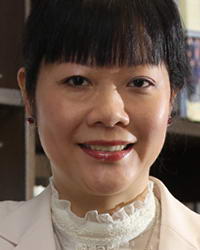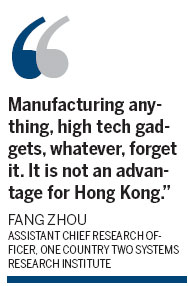-
News >Bizchina
'HK seeks a new identity'
2010-06-28 09:07Daniel Cheng, an entrepreneur in one of the new planned sectors - environmental industries - is providing the government with advice on developing new industries.
The 53-year-old is managing director of the Dunwell Group, which makes machines designed for carrying out oil recycling. The company employs around 100 staff, many of them top level graduates.

Helen Chan, Government Economist for Hong Kong, said doubters of the Hong Kong Special Administrative Region’s economy had got it wrong.
"Germany is still very much into technology and so is the United States so why shouldn't we be?" he asked.
"If you make toys and sell them to the mainland you are dead. They will be copied by the afternoon. If you make sophisticated products, you don't have to restrict your market to the mainland. You can sell to Japan and South Korea where they are prepared to pay for technology and not question price all the time."
Fang at OCTSRI does not believe that high tech manufacturing can ever be brought back to Hong Kong.
"Manufacturing anything, high tech gadgets, whatever, forget it. It is not an advantage for Hong Kong," he said.
Helen Chan, the Hong Kong government's economist, based in the Central Government Offices in Ice House Street, whose dated architecture is in contrast to the shiny skyscrapers of the rest of Central, believes doubters of the Hong Kong economy have got it wrong.
She said the SAR is still a very important bridge to the mainland. "Many people worried about Hong Kong SAR losing out its middleman role after China's accession to the World Trade Organization in 2001 but in fact the region continues to play a very important role as an entry point between China and the rest of the world."
She rejected the idea the economy was too reliant on its financial sector, stating that it made up only 16 percent of the economy and insisted trade, benefiting from Hong Kong's free port status and making up 28 percent of the economy, remained a real driving force.
She was adamant a lot of the critics of the balance of Hong Kong's economy ignored the fact there was a synergy between the SAR as a financial and service center and the manufacturing which takes place in Guangdong province.

"I think it is a perfect partnership between Hong Kong's service sector expertise and the mainland's industrial powerhouse. It is where our competitive advantage lies," she said.
A big concern is what graduates are able to do when they leave university. Many universities have strong engineering faculties but there are few engineering jobs for them in Hong Kong. There is a trend also for mainland Chinese students who graduate from Hong Kong universities now to return to the mainland for work when in the past the opportunities were far more attractive in the SAR.
The number of graduates from the prestigious University of Hong Kong getting work on the mainland increased by 47 percent from 19 in 2008 to 28 last year.
Herman Chan, director of careers and placement at The University of Hong Kong, said some graduates found better opportunities on the mainland.
"The numbers are small but the trend is starting to develop and is likely to continue. It is largely because salary levels are starting to go up on the mainland," he said.
Edward Leung, chief economist of the Hong Kong Trade Development Council, which promotes commercial relations with the SAR internationally, conceded there was a problem with people finding work now in Hong Kong.
"If you train people with certain skills and there is a dramatic mismatch with the job opportunities available, people are going to get very frustrated," he said.
The question often asked about Hong Kong is "What does it do?" One niche is to provide management expertise, particularly in transport such as running ports and airports, to the mainland.
"A large number of companies have tended to export management directly into their Chinese businesses. I would say it is fair observation, however, that this strength in management has not been fully leveraged," said McCool at AT Kearney.
Some believe a major growth sector could prove to be retail. The former colony has just 7 million people. The Pearl River Delta, however, has 50 million.A new high speed rail link, set to be completed by 2013, will cut the journey time from downtown Shenzhen to Central in Hong Kong from up to two hours now to just 10 minutes.
Visa relaxation will also make it easier for people to go to Hong Kong to shop. By around 2030 the Pearl River Delta could also be one huge megacity where people could move freely.
Hong Kong could be the place to shop for mainlanders as well as getting world-class medical treatment and education.
"The problem is that Hong Kong's retail sector is currently constrained by the number of people. If it is opened up to 50 million people it will create many more job opportunities," said Fang at OCTSRI.
McCool at AT Kearney said Hong Kong has gone through many transitions and will get through its current difficulties. "Hong Kong has gone through many rebirths. It was a port and shipping center, a light manufacturing center in the 1960s and has been a gateway to the mainland. It needs to reinvent itself as a peer Chinese city like Chicago to New York in the United States," he said.
